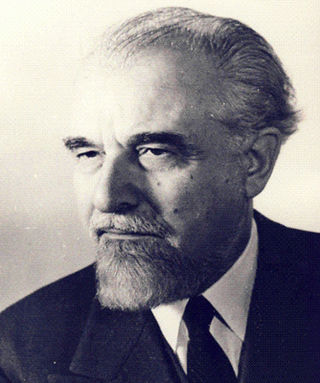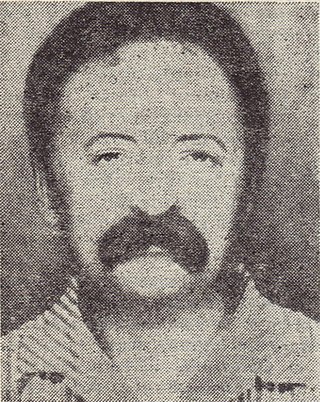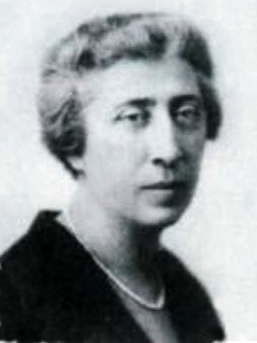| |||||
| Decades: | |||||
|---|---|---|---|---|---|
| See also: | |||||
Events from the year 1948 in Romania. The year saw the formalisation of the Romanian People's Republic.
| |||||
| Decades: | |||||
|---|---|---|---|---|---|
| See also: | |||||
Events from the year 1948 in Romania. The year saw the formalisation of the Romanian People's Republic.
Silviu Brucan was a Romanian communist politician. He became a critic of the dictatorship of Nicolae Ceaușescu. After the Romanian Revolution, Brucan became a political analyst.

Ștefan Voitec was a Romanian Marxist journalist and politician who held important positions in the state apparatus of Communist Romania. Debuting as a member of the Socialist Party of Romania in his late teens, he formed the Socialist Workers Party of Romania, then the United Socialist Party, while also engaging in human rights activism and advocating prison reform. The mid-1930s brought him into contact with the Romanian Communist Party, with whom he formed tactical alliances; however, he rejected its political line, and was for a while known as a Trotskyist. In 1939, he joined the consolidated Social Democratic Party, which reunited various socialist groups outlawed by the National Renaissance Front. During World War II, despite ostensibly withdrawing form political life to do research, Voitec served as the party's Secretary and joined the anti-fascist underground. Some reports suggest that he was also a committed anti-communist, critical of the Soviet Union to the point on endorsing war in the East. As a war correspondent, Voitec made contributions to Nazi propaganda, an issue which made him vulnerable to blackmail in later decades.

Dorin Tudoran is a Romanian poet, essayist, journalist, and dissident. A resident of the United States since 1985, he has authored more than fifteen books of poetry, essays, and interviews.

Leonid Dimov was a Romanian postmodernist poet and translator. He was one of the main representatives of onirism in Romanian poetry, explorer of the dream as an absolute, objective reality.

Sextil Iosif Pușcariu was an Austro-Hungarian-born Romanian linguist and philologist, also known for his involvement in administrative and party politics. A native of Brașov educated in France and Germany, he was active in Transylvania's cultural life and worked as a Romanian-language professor at Czernowitz in the Duchy of Bukovina. He began his scholarly career in 1906, when he was tasked with compiling a general dictionary of the Romanian language. Interested in a variety of disciplines, Pușcariu published widely and brought new ideas into Romania, as well as overseeing two monumental projects related to the language: advancing his dictionary to the letter "L", and creating an atlas of the language.

Ella Negruzzi (1876–1948) was a Romanian lawyer and women's rights activist, and the first female lawyer in Romania (1913). She was a co-founder of the women's organization Association for the Civil and Political Emancipation of Romanian Women (1917), the Group of Democratic Lawyers (1935) and the Women's Front (1936).

Iacob C. Negruzzi was a Moldavian, later Romanian poet and prose writer.
Stephan Roll was a Romanian poet, editor, film critic, and communist militant. An autodidact, he played host to the Romanian avant-garde at his father's dairy shop, publishing his work in short-lived reviews and in two volumes of poetry. As one of the editors of the magazine unu, he turned from Constructivism, Futurism and jazz poetry to the more lyrical format of Surrealism. Roll's political radicalism seeped into his avant-garde activity, and produced a split inside the unu group; Roll's faction discarded Surrealism in favor of proletarian literature, and affiliated with the underground Romanian Communist Party.

Dinu Pillat was a Romanian literary critic and prose writer.

Constantin Erbiceanu was a Romanian theologian and historian.

Matei Socor was a Romanian composer and communist activist.
Constantin D. Dimitriu-Dovlecel was a Romanian lawyer and politician.

Constantin Cantacuzino-Pașcanu was a Romanian politician.

Petre Bejan was a Romanian engineer and politician.

The National College is a high school located at 4 Arcu Street, Iași, Romania.

Mihai Viteazul National College is a high school located at 62 Pache Protopopescu Boulevard, Bucharest, Romania. One of the most prestigious secondary education institutions in Romania, it was named after the Romanian ruler Michael the Brave.
Events from the year 1944 in Romania. The year was dominated by the Second World War. The year started with the Soviet Army assault on Romanian troops and the Battle of Romania. King Michael led a coup d'état during the year and Romania left the Axis powers and joined the Allies. The Romanian army subsequently won victories against German and Hungarian troops.
Events from the year 1947 in Romania. The year saw the abdication of Michael I of Romania and foundation of the Romanian People's Republic.

Events from the year 1951 in Romania. The year saw the Bărăgan deportations.
Alexe Procopovici was an Austro-Hungarian-born Romanian linguist and philologist.